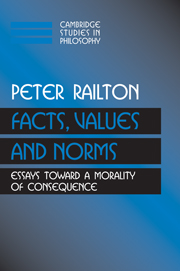Book contents
- Frontmatter
- Contents
- Foreword
- Part I Realism about Value and Morality
- Part II Normative Moral Theory
- Part III The Authority of Ethics and Value – The Problem of Normativity
- 10 On the Hypothetical and Non-Hypothetical in Reasoning about Belief and Action (1997)
- 11 Normative Force and Normative Freedom: Hume and Kant, but Not Hume Versus Kant (1999)
- 12 Morality, Ideology, and Reflection; or, the Duck Sits Yet (2000)
- Index
12 - Morality, Ideology, and Reflection; or, the Duck Sits Yet (2000)
Published online by Cambridge University Press: 18 December 2009
- Frontmatter
- Contents
- Foreword
- Part I Realism about Value and Morality
- Part II Normative Moral Theory
- Part III The Authority of Ethics and Value – The Problem of Normativity
- 10 On the Hypothetical and Non-Hypothetical in Reasoning about Belief and Action (1997)
- 11 Normative Force and Normative Freedom: Hume and Kant, but Not Hume Versus Kant (1999)
- 12 Morality, Ideology, and Reflection; or, the Duck Sits Yet (2000)
- Index
Summary
Should we see morality as an ideology? And, if so, what are we to conclude?
Morality does make an almost irresistible target, a sitting duck, for Ideologiekritik. For it presents itself as a set of evaluations and commands of lofty impartiality or universal validity; yet a glance at history shows instead a succession of norms – all at one point or other widely viewed as moral – that have sanctioned slavery, the subjugation of women, and a host of other purported rights and duties that seem to us in retrospect to correspond more closely to the prevailing distribution of power, privilege, and interests than to conditions of absolute value or universal reason.
Nonetheless, we seem to have a soft spot for morality and moral theorizing. Professional philosophers and historians not excepted, we by and large continue to think of our own morality as something possessing considerable authority (with allowance for the usual slippage between what we practice and what we preach). This social and cultural deference has inspired some of our most incisive intellects – Marx and Nietzsche, to take an interesting pair – to critique morality mercilessly.
“The ideas of the ruling class are in every epoch the ruling ideas,” Marx wrote, and are “nothing more than the ‘ideal expression’ of the dominant material relationships.” Every ruling class will “represent its interest as the common interest” and “give its ideas the form of universality, and represent them as the only rational, universally valid ones” (GI 65–6).
- Type
- Chapter
- Information
- Facts, Values, and NormsEssays toward a Morality of Consequence, pp. 353 - 384Publisher: Cambridge University PressPrint publication year: 2003
- 1
- Cited by



